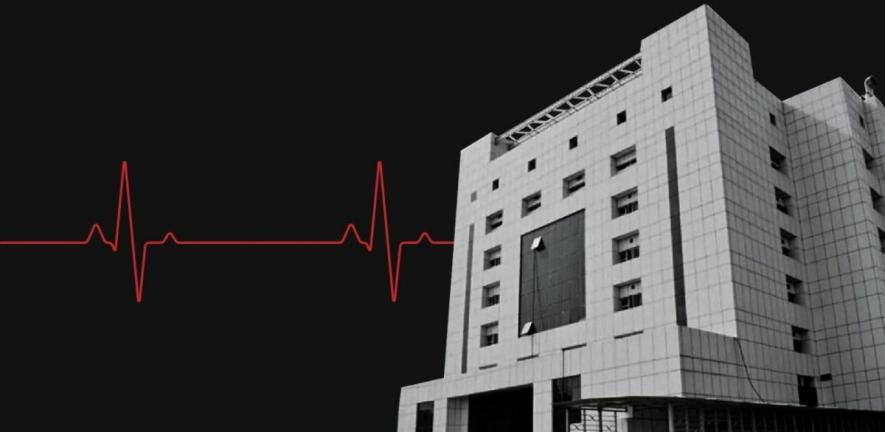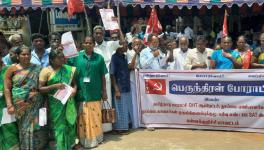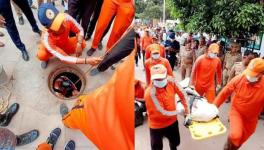Systemic Abuse in Burari Hospital Exemplifies Larger Pattern of Exploitation in Healthcare Sector

Sanitation workers at Burari Hospital in Delhi recently went on strike. The strike has now been called off, but patterns of systematic exploitation, sexual abuse and caste discrimination persist.
—
A few weeks after calling off a week-long strike that highlighted a multitude of grievances, sanitation workers at Delhi’s government’s Burari Hospital are grappling with workplace hostility. Workers accuse hospital authorities of indulging in vindictive actions following their protest.
In a stand against alleged systemic exploitation and abuse, sanitation workers at Burari Hospital in North Delhi began their strike on January 16. The workers, predominantly from the Valmiki Dalit community, raised their voices against a multitude of grievances, including wage exploitation, bribery allegations, sexual harassment, alleged exploitative and corrupt practices of the contracting firm employing them, challenges faced post-return to work, and deep-rooted issues of caste discrimination.
As the protest at Burari Hospital concluded and the strike subsided on January 24, the workers returned to their duties on the promise that these issues would be resolved.
However, the resumption of work came at a heavy price. Now, after their return, the administration is subjecting these workers to different forms of harassment— transferring their shifts and assigning unfamiliar tasks to them, among others. Furthermore, the evening shift workers are grappling with extended working hours.
Santosh, a sanitation worker who prefers to go by her first name, said, “The new supervisor threatened us that now we will bear the consequences of sitting in protest. Despite working in the labour room, I have been assigned duty in the Intensive Care Unit.”
As the workers’ protest comes to an end, each aspect of their fight reveals not only the immediate challenges they are facing but also underscores the urgent need for systemic reforms to ensure fair treatment, accountability and a workplace free from discrimination and exploitation.
Approximately 200 striking workers, including at least 80 belonging to the Dalit community, have levelled numerous allegations against Global Ventures, the company responsible for recruiting and managing the sanitation staff at the hospital.
These accusations range from not receiving their full monthly wages to being coerced into paying bribes for job placements and preferred shifts, along with instances of sexual harassment against female workers.
Lila Devi, 45, one of the women who filed the complaint, said she was abused and transferred to Indira Gandhi Hospital when she refused to pay money to the manager, Rajkumar.
The protest concluded following assurances from Delhi’s health minister, Saurabh Bharadwaj. However, on their second day back at work, the workers disclosed that they were facing repercussions from the administration for their protest.
Wage exploitation and bribery allegations
Sanitation workers at Burari Hospital allege systematic wage exploitation, stating that they are paid significantly less than the mandated minimum monthly wage. The mandated minimum monthly wage in Delhi for unskilled labour is ₹17,494.
Harish Gautam, one of the leaders of the Safai Kamgar Union at the hospital said, “There was rampant corruption under these supervisors and the hospital administration is also involved.
“We tried reaching the hospital administration multiple times including the managing director with our grievances both written and verbal but we were turned down every time. The administration was adamant not to resolve the issue and continue their corrupt practices.”
Sagar, who is also a sanitation worker at the hospital said, “We were on a sitting protest since January 16. On January 19 we received our salaries which were slightly higher but still below the minimum guaranteed salary bar. Also, some workers have still not received their salaries.”
The workers also claim that both the contracting firms: Kartikey Enterprise (contracting firm before Global Ventures) and the current employer Global Ventures demanded bribes for job placements and preferred shifts, adding financial burdens to their already precarious situations.
Deepak, 32, another sanitation worker, said his salary was ₹9,000 a month and he was asked to pay ₹3,000 to the supervisors to retain his job. He also said that he paid an amount of ₹40,000 to Global Ventures when he was rehired.
“We were threatened that we would lose our jobs if we didn’t pay. Supervisors said that those who protested will not be kept back on jobs,” he said.
Manju, 35 who has been working in the hospital for more than a year now, was hired by Kartikey Enterprise and paid ₹40,000 to them on joining and ₹25,000 to Global Ventures when she was rehired to secure her job.
The workers also claim that they are denied essential statutory benefits, including Employees’ State Insurance (ESI), Employees’ Provident Fund (EPF) and bonuses, highlighting a significant violation of their rights and entitlements.
As per the provisions of the Payment of Bonus Act, 1965, they are entitled to receive bonuses.
Rajesh, 45, said “There are no fixed salaries. They pay us according to their will. Also, there is no fixed time to receive our salaries. Even our week offs are not fixed. Sometimes our salaries are held back for months.”
Poonam said, “Every month, ₹105 is deducted from our salaries for the ESI but we haven’t received the card from the hospital. We are not paid any bonuses. Even the money for Diwali gifts was deducted from our salaries. I also paid ₹35,000 to Global Ventures at the time of joining.”
Battle against sexual harassment
The striking women workers brought to light deeply concerning issues and incidents of sexual harassment within the hospital premises.
Two female sanitation workers filed a first information report (FIR) against their supervisors, Deepak, Neeraj and Adarsh, and manager Rajkumar. The four accused are charged under Sections 323 (voluntarily causing hurt), 354 (outraging modesty of a woman), 506 (criminal intimidation), and 34 (criminal act done by multiple people with common intention) of the Indian Penal Code (IPC). They are currently out on bail while suspended from the hospital.
This recent case is not the first occurrence of sexual harassment reported by female workers in this hospital. A prior FIR, dated June 6 filed at the Burari police station, also levelled serious allegations against two of the four accused involved in the recent situation.
According to the workers, after the June FIR, the supervisors were rehired by Global Ventures.
Mandvi Mishra who is also a member of the Safai Kamgar Union said, “Women workers are being constantly threatened to settle the matter outside the court,” She also alleged that the administration knew about this. According to her, the deputy nursing superintendent Rani Bharti was a witness to the case in June but did not intervene.
Reportedly, there was no internal complaint committee in the hospital and workers were not sensitised to sexual harassment laws and rules. Both these issues were hastily addressed after the protest.
However, even after its formation, the internal complaint committee, which is supposed to be confidential, faced criticism for recording victims’ statements in a non-confidential manner (they were called in groups), with a report released within eight hours.
After the protest, for the first time since the hospital’s establishment, a 20-minute sensitisation workshop on recognising good and bad touch was conducted, a step she considered long overdue.
Harish Gautam, state executive member of Safai Kamgar Union said, “There have been multiple incidents of sexual harassment. I think the main reason is vulnerability and job insecurity. They don’t need to know good touch and bad touch, they are mature enough. They need to know how to file a complaint and to whom.”
One of the workers, Sunita, 35, caught supervisor Rajkumar on record asking for sexual favours and also to bring along other women workers. The sanitation worker was asked to keep her mouth shut otherwise she would be fired.
Rajkumar is heard saying, “I have a habit. I don’t like it shaved down there. You’re wise enough to understand everything. But if you tell this to others, it won’t be good for you.”
“Preferred shifts and more work are given in exchange for sexual favours. A lot of women fear to come forward. I was brave enough to file a complaint but why are they not behind bars? I don’t mind losing my job but I won’t lose my dignity,” said Sunita.
Challenges post-return to work
Despite assurances from Delhi health minister Saurabh Bharadwaj that their services would not be terminated illegally, workers who returned to work after the strike now face increased challenges.
Allegations include being assigned unfamiliar tasks, longer working hours for evening shift workers, and an overall hostile work environment, exposing ongoing challenges even after the return to work.
Complaints against the workers are being meticulously recorded, and attendance is being marked not on official registers but on blank papers allegedly so that workers’ attendance can be manipulated.
Poonam, a sanitation worker at the hospital, said, “Now we have joined back but the administration is troubling us. Our duties are changed and we are given work about which we do not have the requisite knowledge. Then if we are unable to perform satisfactorily, complaints are registered against us.”
Renu Devi, 34, who voiced out against sexual harassment back in October said, “I was fired in October and they are not hiring me back. It has been six months. They keep sending me to the head office in Dwarka for approval. Rajkumar even took ₹25,000 from me to hire me back. Everyone was in protest but why wasn’t I rehired? He said they can’t rehire me because I spoke to the media.”
“Both my parents are paralysed. I am the only working member in the family. I am not even able to pay for my parents’ medicines. Right now, I am working as a house help to support my family. But I earn only around ₹2,000 which is not sufficient,” she added.
Union member Mandvi alleged that the workers were even told to sign an apology letter dictating that they wouldn’t protest again. “They are threatening the workers that they will make sure the next contract company does not hire them,” she said.
Caste-based injustice
The protests have also unveiled deep-seated issues of caste discrimination faced by workers, primarily belonging to the Valmiki Dalit community. The workers allege discriminatory treatment, adding another layer to their struggle for justice. The call for dismantling caste-based discrimination within the workplace has become a crucial aspect of the larger movement.
These workers are now burdened with tasks beyond their usual duties, such as cleaning urine bags and stool pots. Workers are even made to clean vomit and wash bedsheets.
Harish Gautam said, “This is the job of nursing staff but these sanitation workers are made to do such work just because of the community they belong to. Caste is being used to decide the work and job profile for these workers.”
Delhi government, Global Ventures and Kartikey Enterprises could not be reached for a response.
A long fight for justice
The sanitation workers, members of the Safai Kamgar Union, have been relentless in their fight for justice. Despite facing legal hurdles, including the suspension and subsequent bail of accused supervisors, the workers remain steadfast in their pursuit of fair treatment, accountability and an end to exploitative practices within the hospital.
As the situation unfolds at Burari Hospital, the workers’ protests not only expose the exploitation and injustice within the hospital’s premises but also bring to the forefront broader societal issues that demand urgent attention and systematic change. The collective voice of these workers serves as a poignant reminder of the urgent need for reform and justice within the realm of contractual employment in Delhi.
“Burari Hospital is just an instance of a larger concern. Contract workers are the most exploited. This is an ongoing wage scam. There is rampant casteism against the Valmiki community. Through economic exploitation and job insecurity, a cycle of poverty is created.” Gautam said.
Devanshi Batra is a Delhi-based freelance journalist. She writes on gender, human rights and minority issues.
Get the latest reports & analysis with people's perspective on Protests, movements & deep analytical videos, discussions of the current affairs in your Telegram app. Subscribe to NewsClick's Telegram channel & get Real-Time updates on stories, as they get published on our website.
























